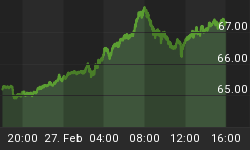The U.S. Dollar overcame a mixed opening in New York to finish higher for the session. The boost for the Dollar came from the better than expected 9.6% surge in New Home Sales. Prior to this report the Dollar was trading weaker versus the Euro and New Zealand Dollar while posting gains against the British Pound and Canadian Dollar.
Mixed trading activity in the U.S. equity markets helped pressure the Australian and New Zealand Dollars. The divergence between these two currency pairs and the U.S. stock markets could be a sign that trader appetite for risk is waning. Weakness in the Chinese equity markets is also weighing on the Aussie and Kiwi along with concerns that the Chinese central bank may impose limits on liquidity. Traders fear this action may curb demand for Australian and New Zealand exports.
Technically the AUD USD remains in an uptrend, but a new lower top at .8428 has been formed. The NZD USD is also in an uptrend, but yesterday's closing price reversal top was confirmed. This pattern is usually the first sign that a major top could be forming.
The USD CAD rallied on Wednesday boosted by lower crude oil prices. The biggest influence on the Canadian Dollar today was yesterday's comments from a Bank of Canada official expressing his concerns about the appreciation in the Canadian currency. The BoC fears that a rapid advance in the Canadian Dollar will threaten economic growth. Traders fear the BoC may take action to curb the advance and are lightening up positions in a preemptive move.
The USD JPY traded flat today. The inability of the U.S. equity markets to pick a direction weighed on traders' minds today. Lately Japanese investors have been repatriating their capital because of weakness in the Chinese equity market and on speculation that U.S. stock markets may be due for a correction.
The main trend turned down on the daily chart for the GBP USD when this currency pair crossed under 1.6274. Pressure has been on the British Pound for almost all month following the decision by the Bank of England on August 6th to expand its asset buyback program. This sent a message to traders that the U.K. economy was still weak. The change in trend to down is a sign that traders believe that the U.K. economy will lag the U.S. and Euro Zone in the recovery from the global recession.
After an early surge to the upside after Germany reported a boost in business confidence, the EUR USD weakened when the U.S. posted a better than expected gain in new home sales. Although the recent economic news has been friendly coming out of the Euro Zone, gains have been limited by comments from the European Central Bank. While Fed Chairman Bernanke is willing to tout a U.S. economic recovery, the ECB is warning investors of the potential bumps in the road to recovery.















